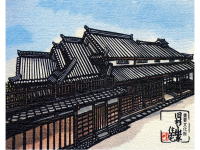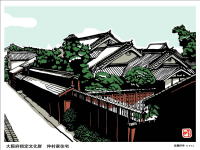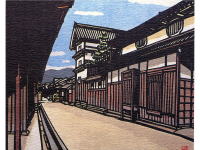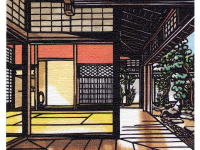富田林寺内町の探訪
I'm glad to intorduce an old town, Jinaimachi, Tondabayashi, Osaka, Japan as a national historic district and heritage site.
It takes 30 minutes from Osaka city to Tondabayashi station by Kintetsu railways. A 10-minutes walk will take you to the historic town.
ギャラリー
welcome to jinaimachi town, tondabayashi, a historic district, japan
| 【Tourist guide to Jinaimachi town, Tondabayashi, a historic district and heritage site of Japan,Travelogues by Author - Series Vol. 25 Koushouji Betsuin Temple, an important cultural property and Restaurants】 | |
| August 31, 2014, Sunday The main hall of the temple is divided into an outer chamber and inner chamber by sliding doors on the paper surface of which elaborate painting works were drawn by Kano Juseki Hidenobu, a Kano school painter purveying to the Tokugawa Shogunate in the Edo period. The works are called the "Sho Chiku Bai" (an auspicious combination of pine tree, bamboo and plum tree). Kano Juseki Hidenobu. is a painter depicting the famous pine trees at the great corridor of the main ward of Edo-jo castle, literally called a corridor of pine trees, where a well-known affair of sword fight happened. Written on September 1, 2014 by Author in Yokohama |
|
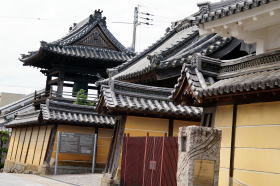 Koushouji Betsuin Temple Important Cultural Property of the country |
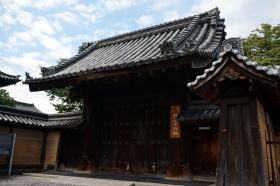 Koushouji Betsuin Temple Important Cultural Property of the country |
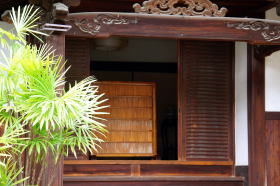 Dedicated meeting room for royal family Important Cultural Property of the country |
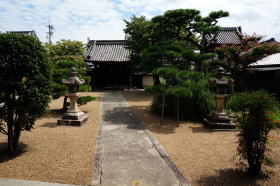 Precinct |
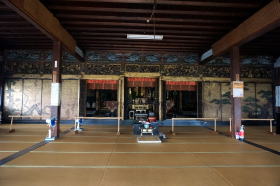 The main hall Important Cultural Property of the country |
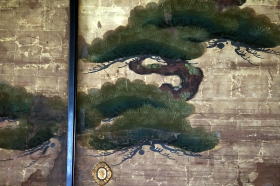 "Pine tree, bamboo and plum tree" painting works by Kano Juseki Hidenobu |
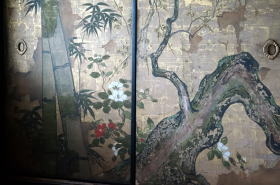 "Pine tree, bamboo and plum tree" painting works by Kano Juseki Hidenobu |
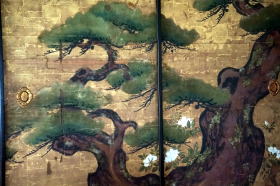 "Pine tree, bamboo and plum tree" painting works by Kano Juseki Hidenobu |
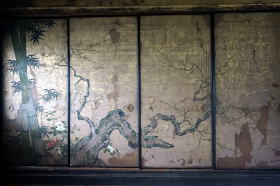 "Pine tree, bamboo and plum tree" painting works by Kano juseki Hidenobu |
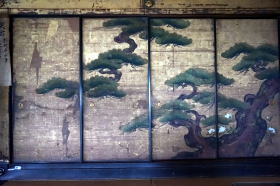 "Pine tree, bamboo and plum tree" painting works by Kano juseki Hidenobu |
| In addition, in the interior of the Koushouji Betsuin main hall, the structure
called Kaerumata at the top of the beam of the front, that looks like stretched
frog's legs, can be seen as decorative sculptures colored in vivid which
show seven episodes. The seven sculpture work are derived from the twenty-four paragons of filial piety in old China selected by Guo Jujing (Kaku kyo Kei in Japanese) during the Yuan Dynasty. Temples also used to be a primary educational institutions called Terakoya in the Edo era in Japan and by showing a sculpture, the teachings of Confucianism was inculculated to children. |
|
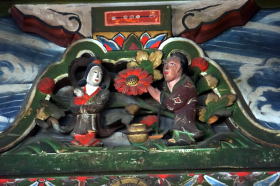 |
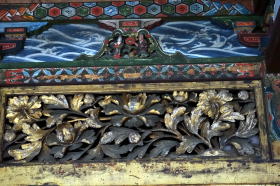 |
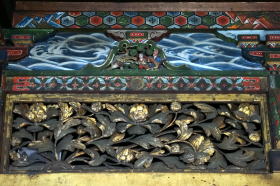 |
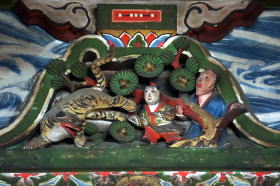 |
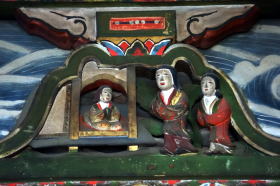 |
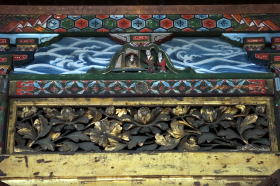 |
 |
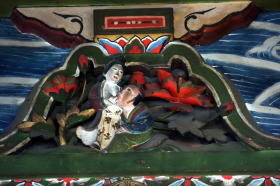 |
| In the afternoon, at the Oasi Italian restaurant close to the former residence of Sugiyama family, an important cultural property of the country, I took time and enjoyed
the authentic Italian cuisine, while overlooking the landscape of well-maintained
Japanese garden. Mr. Sugimoto, the chef and owner of the restaurant, goes out every morning to purchase fresh vegetables which are cultivated by local farmers in neighborhood of Minami-Kawachi and Senshuu regions. As the networks among Mr. Sugimoto, local farmers and Michi-no-Eki, or roadside stations have spread, the chef asked local farmers to cultivate new vegetables or he is also suggested by them to select fresh vegetables of their agricultural products. The kind of local vegetables that rests on the table has been recently increasing . In addition, under the concept of "local production for local consumption", he also use Inunaki pork as ingredients locally produced in Senshuu region, Osaka Pref. Plates are elaborate pieces and good appearance. Valueing the relashipship with the neighborhood, "vessel of the earth" has been specially produced by handmade pottery workshop Asuka, a 2-minute walk from the resutaurant. |
|
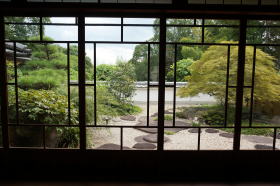 Japanese garden can be seen from dining room |
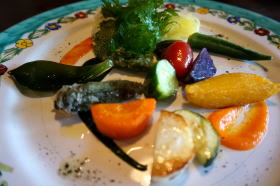 Local fresh vegetables on the plate |
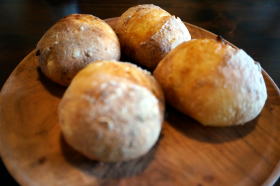 |
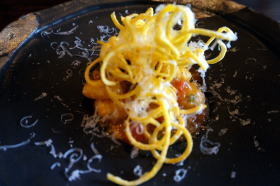 |
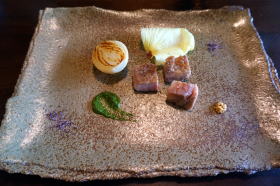 Inunaki pork served on the plate "vessel of the earth" which has been specially produced by handmade pottery workshop Asuka |
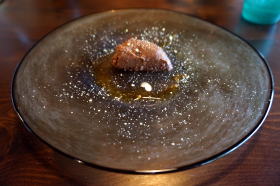 Chocolate desert made of specially selected local eggs |
| After finishing the lunch at Oasi Italian restaurant, on my way back from Jinaimachi town to Tondabayashi station, I tried
to stop by a newly-opened cafe restaurant "Shiori" along the central shopping district. An old townhouse was retrofitted
to the cafe restaurant and opened on June 1, 2014. Entering into the inside of the cafe resutaurant, an exhibition space on the tatami mats is available for art gallery. On the day, stunning artworks by Mr. Iwano, a nextdoor bicycle shopkeeper have been exhibited. Large tatami rooms of the back have become a dining space. Dining tables and seats are placed on the tatami mat, whcih make visitors feel relaxed and comfortable. You can enjoy the garden (yard) on the veranda of the dining room and dining terrace on the wooden deck viewing the garden is also available. |
|
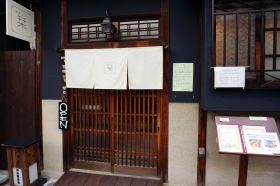 Machiya Cafe Shiori |
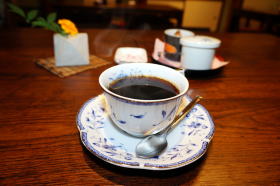 |
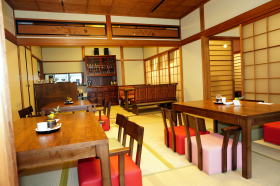 Dining room |
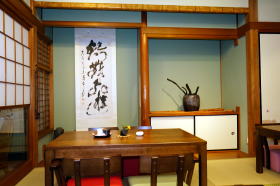 Dining room with alcove and tatami mats |
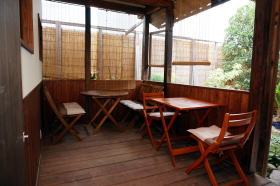 Dining terrace |
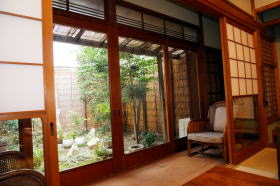 Japanese garden (yard) |
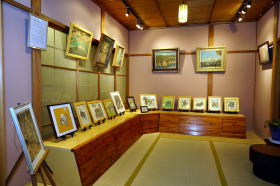 Art gallery |
|
Information

Location
Jinaimachi town, Tondabayashi city, a national historic preservation district
and heritage site of Japan, which is located in the south-eastern part
of Osaka prefecture, the western part of Japan
Directions to Jinaimachi town, Tondabayashi
It is a 10-minute walk from the Tondabayashi Staion or the Tondabayashi
Nishiguchi Station of Kintetsu Nagano line.
From Kansai International Airport
Airport Limousine Bus service available bound for Kawachi Nagano Station.
(60 minutes) Please take Kintetsu railways from Kawachi Nagano to Tondabayashi.(15
minutes)
From Osaka International Airport (Itami Airport)
Airport Limousine Bus service available bound for Abenobashi Station. (30
minutes) Please take Kintetsu railways from Abenobashi terminal to Tondabayashi.(30 munites)
From JR Shinkasen Shin-Osaka station or
Osaka (Umeda) station
Please take Subway Midousuji line from Shin-Osaka station or Osaka (Umeda)
station to Tennoji Station. (20~30 minutes) Please change trains at Tennoji
and take Kintetsu railways from Abenobashi terminal to Tondabayashi. (30
minutes)
The site-seeing map available in English
Please stop by to the Tourist Information Cetnter or Jinaimachi Visitor
Center.
Restrooms
Available at Jinaimachi Visitor Center (Jinaimachi Kouryuukan), Jinaimachi
Center and Jinaimachi Tenbou Hiroba (Viewing Terrace)
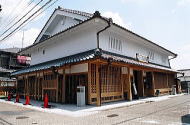
Visitor Center
(Jinaimachi Kouryuukan,
Town Community Center)
Address
9-29, Tondabayashi-cho, Tondabayashi city, Osaka, 584-0033, Japan
TEL.+81-(0)721-26-0110
FAX.+81-(0)721-26-0110
open 10a.m. until 5 p.m.
closed on Monday
Visitor Parking
Road width is very narrow in Jinaimachi town. If traveling by car, please
use Tondabayashi Municipal east parking newly opened in February 2014 (Toll
parking).
You can park the minibus for groups and passenger cars for general use.
Only one parking lot available for minibus, you must book it in advance
with Tondabayashi City Hall. A 15-minute walk to the Jinaimachi Visitor
Center and 5 minute walk up to the former Sugiyama family house, an important
national cultural property.
You will note that the large tourist bus for groups is requested to be
parked at the Tondabayashi City Hall No. 2 parking lot alongside the old
Route 170 (It must be booked in advance to City Hall). 20-minute walk to the Jinaimachi
Visitor Center and 10 minute walk up to the former Sugiyama family house,
an important national cultural property. Thank you in advance for your
kind cooperation.
